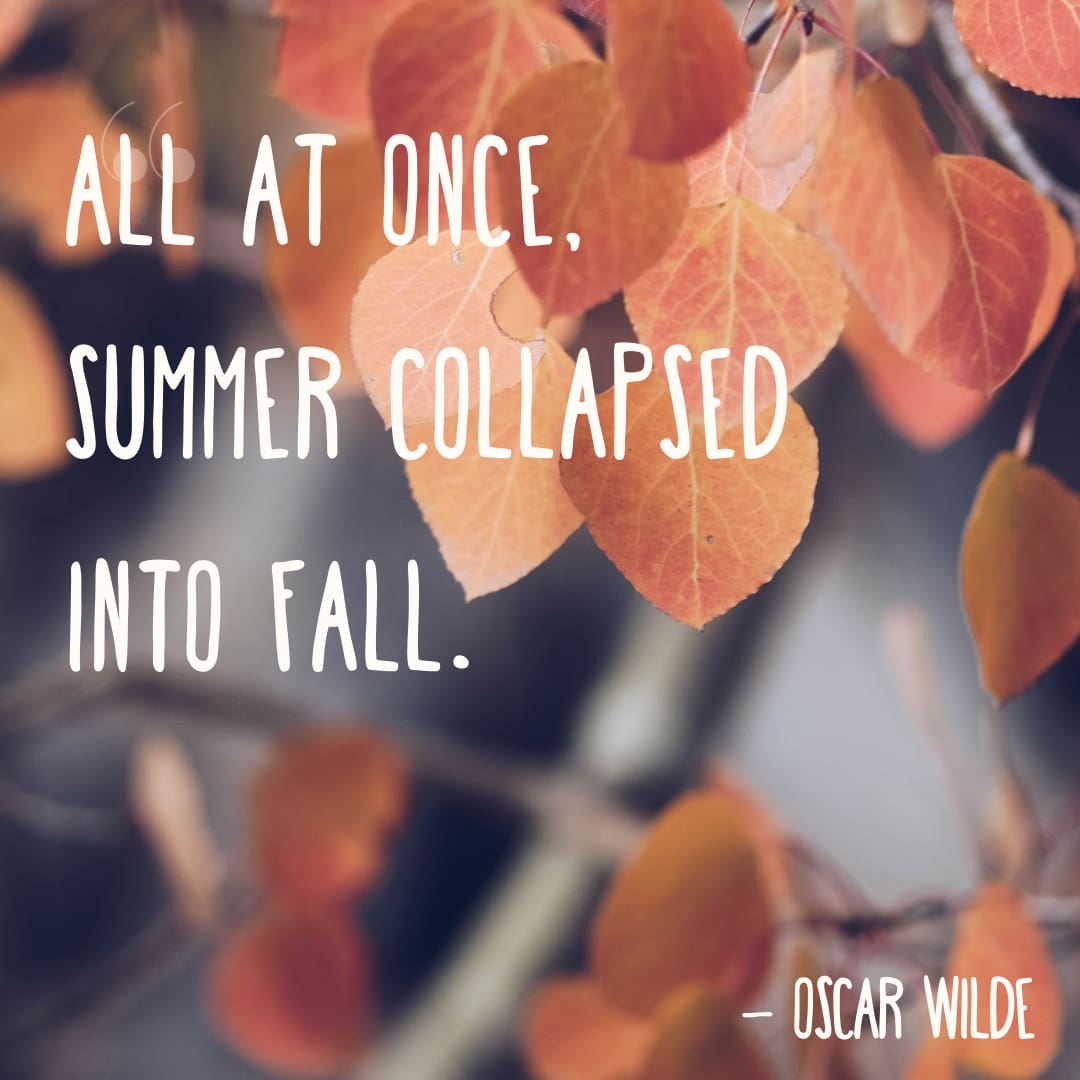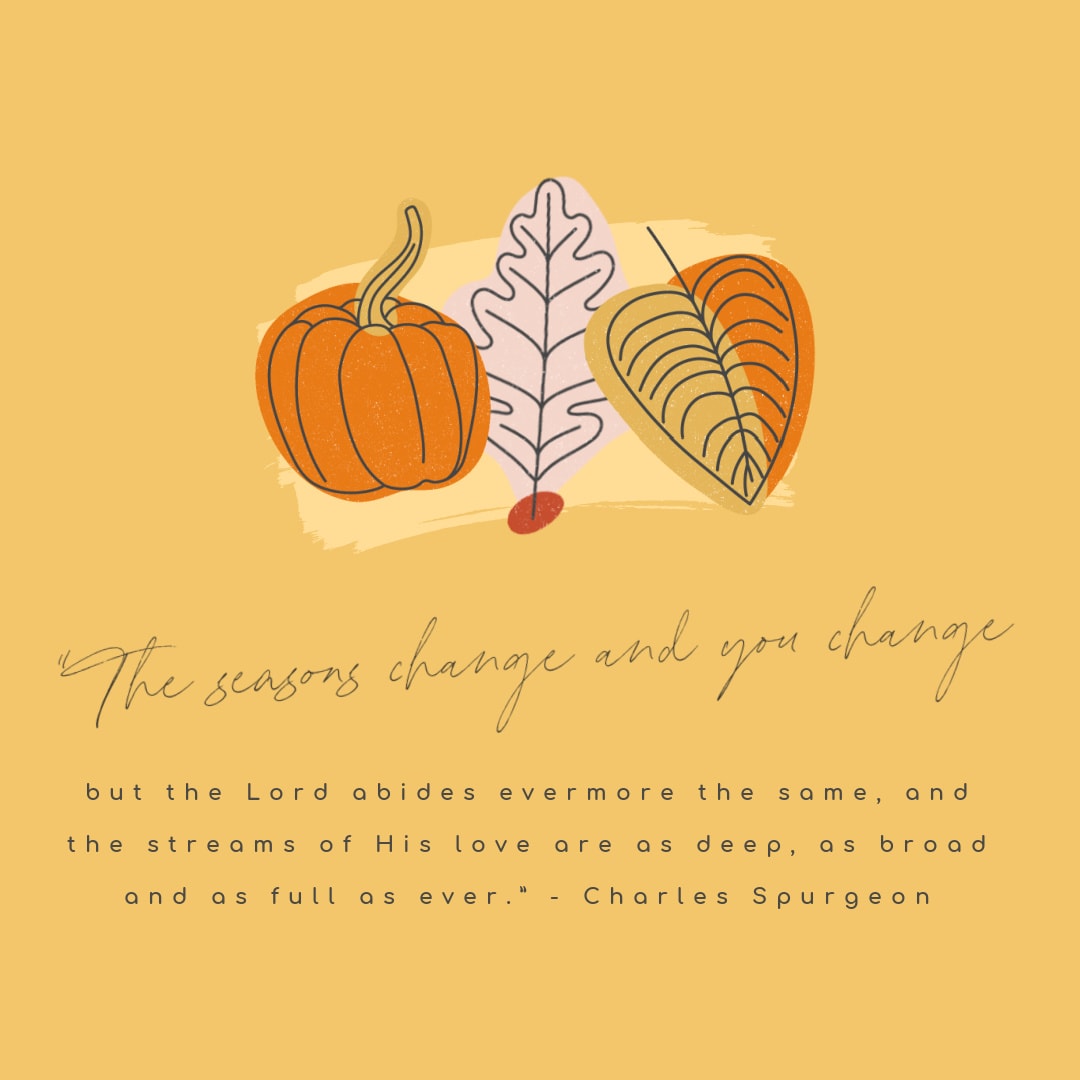“The crickets sang in the grasses. They sang the song of summer’s ending, a sad, monotonous song. ‘Summer is over and gone,’ they sang. ‘over and gone, over and gone. Summer is dying, dying.’ The crickets felt it was their duty to warn everybody that summertime cannot last forever. Even on the most beautiful days in the whole year—the days when summer is changing into fall—the crickets spread the rumor of sadness and change.”
– Charlotte’s Web
Leave it to a children’s book to get us all in our feels about the ending of summer. Today, the first day of autumn, may well be one of “the most beautiful days in the whole year,” but as E.B. White noted so eloquently, the most glorious autumnal debut is not without sadness. Like every transition, the evolution from summer into autumn is bittersweet. . . because every new beginning is saddled with an ending, and even the loveliest of births is not entirely unmarred by a fading away.

As challenging (or wonderful) as the rotating of a calendar season may be, one thing it is not is unexpected. Autumn follows summer just as surely as dawn precedes darkness, a river flows to an ocean, or a seedling expands into a tree. Other seasons—those not of the calendar variety—are less predictable. We don’t always know when a new one is approaching, or how long it will last, or even whether it will end. We may be expecting a season and be given a forever; or we could be settling into what we assume will be a forever that ends up being a just-for-now. Not all seasons are given the benefit of a cricket’s farewell song.
In my own life, I have a terrible track record with predicting what aspects of my life are seasons and which are something more. I cannot tell you how many times I have adopted a new “short-term” hobby that ultimately stayed with me for years. (This blog is one example: it has been more than NINE years since I opened this space I assumed may be a couple-year project). Some parts of my life have actually become a part of me, little “visitors” that ultimately decided to take up residence.
Often the reverse has occurred: I have said goodbye to friendships I thought would live on indefinitely, ones that did serve me well in their short-term seasons but ultimately were not to last. I have let go of ideas or beliefs I was certain were an indelible part of me but ultimately evolved into something else. Almost every stage with my kids has felt like it might go on indefinitely, but kids don’t stay small forever and (for better and for worse) almost nothing with them has been permanent.

Because the harbingers of these metaphorical seasons are not as foreseeable or straightforward as a cricket’s song or the number on an iCal icon, I must take care with my approach. I want to handle budding relationships and newly adopted habits and established agreements with prudence, recognizing their potential for longevity. I would hate to approach any friendship as disposable, especially when that awkward acquaintanceship could be the start of an unanticipated lifelong friendship (I’ve had a few of those!). And I would not want to take on a new activity or practice that is not in my (or others’) best interest just because I’d wrongly assumed it was a “just for now” nuisance. . . it could very well become a long-haul inconvenience with dire implications.
On the opposite end of the spectrum (the side I tend to fall on), I do not want to take any season for granted because I am assuming it will last. Few things do. Too often I become careless with a situation or relationship because I anticipate more time—time to adjust, time to embrace, time to improve. And yes, it is sometimes true that there will be more time, but sometimes the time is cut short and I’m forced to admit that I had not given that particular season the wholeheartedness it deserved.
Zooming out a little further, we can see the spiritual aspects of a “for now or forever” dichotomy: our bodies are temporary, as are all of our earthly circumstances, but those ephemeral bodies and circumstances play into our eternity. Jesus implored His followers not to worry about tomorrow, yet this same Jesus understood the weight of the “eternal tomorrow” more than any other human. He took on human form for three decades (a minuscule stretch compared with all of eternity) while recognizing those thirty brief years would transform all of our forevers.
Where, then, shall we land in our approach to the changing (or unchanging) seasons? Perhaps we can take our cue from the crickets, whose song accompanies this turning from summer to fall: they celebrate one ending, acknowledging the beauty of what was and making space for the beauty that is to come. They sing out as though their song might go on forever, even when the song itself is one of closure. Their song takes on a forever posturing with a simultaneous appreciation for the season. I wonder if we can do the same: living with full awareness that all of life is precious and worthy of our care—by nature of its potential longevity OR its inherent brevity.

A life has not been less worthwhile if it is cut short. A relationship is not a throwaway one if it will be one of months rather than years. A temporary job can be just as important as one held for a lifetime. And a period of busyness or solitude or grieving or celebration or connection can shape so much of everything that is to come.
We shortchange our seasons when we give too much weight to their impermanence. But we suffocate our seasons when we refuse to let them evolve. There is a sweet middle ground of carrying a forever posturing alongside a seasonal awareness: both can be for what is for now and all that is forever.